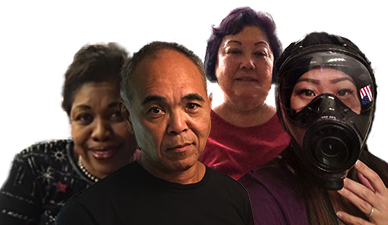RHS'69

The Day the Earth Stood Still
Friday, February 23, 2018
The day the Earth stood still. Sounds like an old B-movie, except it happened on January 13th.
An Emergency Management Agency watch officer received a test and decided it was the real thing.
Out went the alarm and many of the 1.5 million people in Hawaii thought they had about 20 minutes before their world went up in a puff of smoke and radioactivity.
Three RHS'69 alum and a guest describe their January 13th morning.
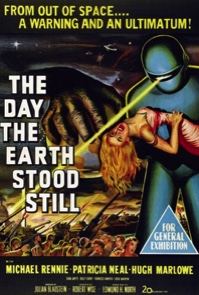
Some days, when something big happens, you always remember where you were and what you were doing.
Novemeber 22, 1963 - the day President John F. Kennedy was assassinated.
July 20, 1969 - the first men land on the moon.
For many people in Hawaii, they can now add January 13, 2018.

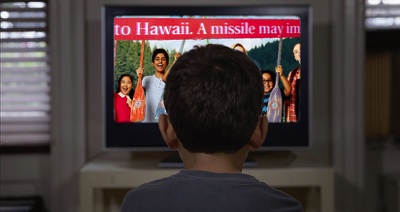
We start off with Gail Youn...
I was in my bedroom, unaware of the alarm. My eight-year-old grandson, Rylen, was watching the Disney Channel when the attack notice came across the TV screen. He had just learned in school about the alarm system and came into my room to tell me.
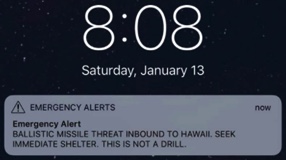
At first I thought , "But, there's no siren."
Then I received the alert on my phone, so my second thought was better safe than sorry!
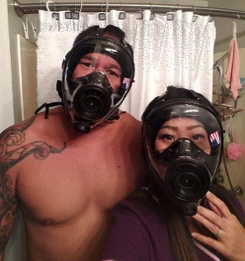

By this time, my son-in-law, Sean, who is an avid survivalist, went to an upstairs bedroom and began carrying down food, water filters, gas masks and other emergency supplies he had stored there.
Meanwhile, I grabbed blankets, pillows, towels, my four-year old granddaughter, Londyn and Rylen and placed them all in the bathtub in a bathroom located in the center of the house away from all windows.
Then I called my daughter. She was on her way home from night shift duty as a nurse. When she answered, she was at a stop sign two blocks from home.
As I told her what was happening, she saw the car just in front of her run through the stop sign and speed off into the distance.
When she got home a few minutes later, we all waited together in the bathroom. By this time more than 10 minutes had passed and we were suspecting that it was a false alarm. Thank goodness!
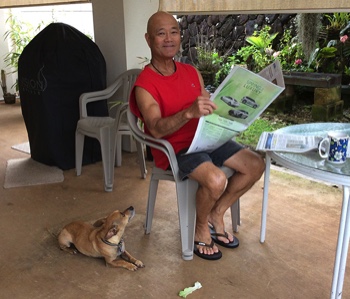
Then there was Jo Chikuma's morning...
It was a typical Saturday morning. Around 8am, Brad was sitting on the lanai, reading the newspaper with a cup of coffee, while at his feet, his faithful canine friend, Scout, was chomping on his daily meal. Then, Brad received a text from our daughter, Jamie.
"Is this for real?", she asked..
She had received a text from her husband, Dan, who was at work asking if she had any information about the warning.
Having received no alert on his phone, and with no sirens or other indications of an emergency, Brad responded that he didn't think it was for real. Then he went back to reading the paper and enjoying his coffee.
Meanwhile, I was in "lala land" until 9:00 am or so, not aware of anything. Brad didn't even wake me.
When the false alarm became evident, everyone we knew was upset, blaming whomever they could - the Governor, Hawaii Emergency Management Agency, the button pusher. We, however, were calm and collected, probably because we didn't react to the warning.
Still, we agree that this was a good wake-up call. It showed how uneducated and unprepared we all are.
Even after attending the emergency preparedness presentation with Ken Arima, at the October alumni meeting, we're still not prepared! We have stored canned goods in a room with a window, 50 pounds of rice in sealed bags from Ken, and five empty 5-gallon water jugs under the stairwell. This area is supposed to be our shelter, but is still cluttered with junk , so no room for any human beings. I think we need to get going on preparing our "shelter".
Finally, to John Takara, who pulled all these stories together...
I had just finished frying an egg and was sitting down to breakfast when my wife, Liane, receive a call. It was a friend asking if we were aware of a ballistic missile alert. She had received a warning from an app on her cell phone.
Random thoughts immediately raced through my mind. "Oh no, what do I do? Why didn't I get an alert on my phone? Why aren't the sirens on? Why are they attacking us? We invited them to the Olympics! "
While Liane continued to talk, I turned on the TV to scan the news. None of the stations were broadcasting warnings. I was skeptical, but still alarmed.
I had just read a book about how people respond during a crisis. I remembered that the most common mistake is to delay. I also remembered that Hawaii has only 10-15 minutes following a warning before a missile arrives from North Korea.
Then, a ticker tape message scrolled across the TV screen:
"Ballistic Missile Inbound. Take Immediate Shelter. This is not a drill", it read.
I leaped from the chair and started down the hall to the basement, calling after Liane to follow me. She called back asking if our friend could come over.
"OK", I yelled, heading down the stairway. In the basement, I found a transistor radio and tuned in for any alerts. There were none. Meanwhile, Liane was running around getting jugs to fill with water.
"Get down here!", I yelled at her, "We don't have time!"
I then called the kids in California to let them know what was happening. After a few minutes, our friend and her sister arrived. Then, we just sat and awaited our fate.
After a half hour, we got false alarm notices on our phones and on the radio. Relieved, our friends went home and I returned to my breakfast. The eggs were cold, thankfully, the only casualty of the morning.
So what are the lessons learned? First, my hurricane preparations should be tweaked for a missile attack that allows no prep time. For example, I need to have water stored beforehand.
Second, I need additional stores of emergency supplies for friends who may ask to shelter with me.
Third, I pray that all my disaster preparations are a complete waste of time and effort.
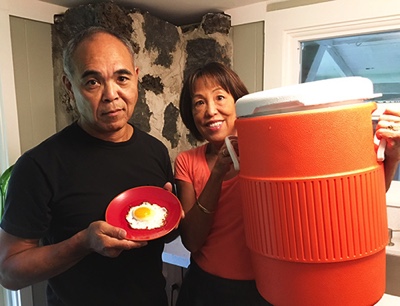

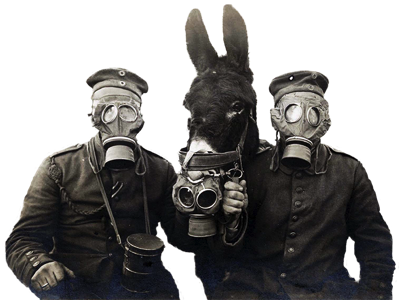
Martha Kholpin is an honorary '69 alumi...
Once in a while someone will say to me, "I'd like to die in my sleep. That's how I'd like to go."
I usually say, "Yeah, me too", then politely change the subject. Who knows, right?
Well on January 13, 2018 my adult children, both in their 20's, used their spare key to come bursting into our condo announcing we were all going to die.
Quite a way to wake up.
Still sleepy I didn't notice the sheer panic on their faces or the fear in their eyes. "Yes, we all will die someday, but not today." My son shouted, "Yes, today! Mom, we're going to die any minute. Didn't you see the alarm?"
"No, I was asleep."
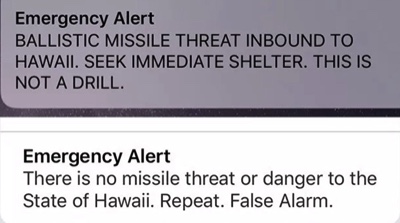
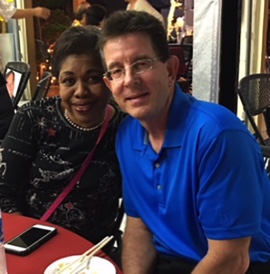
I picked up my cell phone and there it was - Ballistic Missile Attack - This is not a Drill."
A millisecond later an announcement appeared saying it was a false alarm.
My husband and I were now fully awake and we started our usual morning routine.
As he went to make coffee my son said, "We called your cell phones - no answer. So we ran down 33 flights of stairs at our place, drove in crazy traffic avoiding drivers running red lights, driving on the wrong side of the road and going the wrong way on one-way streets. It was a nightmare. When we arrived at your building the elevators were jammed and lobby filled with frightened people, so we ran up 15 flights of stairs to warn you. Every step we thought we might not make it. Dad, are you just going to have a cup of coffee?"
"Really", says my husband. Son, you and your sister should have stayed in your building. It was dangerous to come out to warn us."
Then my son really lost it, "We knew we could be in danger but if we were attacked we wanted to spend our last minutes with you and mom. Gee dad, you don't understand what we've been through."
I grabbed both my kids and hugged them. Everyone calmed down as we had breakfast and thanked God for another beautiful day in Hawai`i nei.
I rested well that night, knowing if it were a real attack I would have been alseep - oblivious to it all.
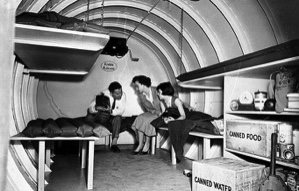
The chances of a missile attack against Hawaii are very small. But as an isolated state we are vulnernable to disasters that can isolate us for several weeks. There are no neighboring states to truck in equipment and people. It can be a while for help to arrive from the mainland, especially if our harbors and airports have been damaged. Tsunami, earthquake or hurricane warnings are common alerts and authorities stress the need to have extra food, water and other supplies to take care of yourself and your family. New guidelines suggest a month is a good starting point. Read this.
Water - one gallon a day per person
Food
Can opener
Lighter or matches
Medicines
Pet food
Extra clothes
Plastic sheets and duct tape to seal doors and windows
A portable radio
Flashlights and extra batteries
First aid kit
Face mask to filter air
Towelettes and plastic bags
Basic handtools like screw drivers and pliers
Even if the supply routes are working, damaged roads can prevent help from getting to your area for days. You and your family may be on their own. Be prepared.
Learn more...
Surviving an attack
Best overall disaster planning
